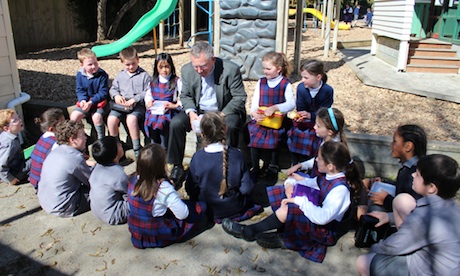Passing on extra vegetables grown in the garden to people in need, and sharing what food we have, were suggestions that students at St Teresa’s School in Karori gave today to help overcome hunger and food insecurity in New Zealand.
The students were talking to Catholic Archbishop of Wellington John Dew over lunch, prior to the Catholic Church’s Social Justice Week focus on food security. Social Justice Week runs 9-15 September, and is an opportunity for Catholics and the wider community to consider a current issue in the light of Catholic social teaching.
“Because we pray together “Give us this day our daily bread” we want everyone to have the food they need, because we all belong to the family of God,” Archbishop John told the school pupils.
“About 20 percent of New Zealand families with children don’t have enough food, or have some sort of food trouble,’ Archbishop John said. ‘But our country could produce enough food for five times our current population. So we are trying to get everyone to talk about what we might do.”
Food security is the ability to legitimately and regularly access safe and nutritionally adequate food. The Catholic Church’s social justice agency Caritas has produced resources for parishes, schools and the wider community to help people better understand what food insecurity looks like in New Zealand and overseas.
Caritas Aotearoa New Zealand has also launched an interactive website Breaking bread together to provide commentary and debate on topical issues of food production, supply and distribution. ‘Our daily blog’ will provide opinion on food issues throughout September. The site also features videos, games, reports and resources, and opportunities for people to comment and add their own ideas.
“Social Justice Week is an opportunity for all of us to examine our attitudes and actions with regard to food, says Caritas Director Julianne Hickey. ‘We have the resources to feed all our people. So we’re encouraging New Zealanders to see what steps they can take to combat hunger both in the world and in New Zealand.”
“For example, one small step at the advocacy level people can take right now, is to participate in the Commissioner for Children’s consultation process on child poverty. Feedback and submissions are due on 12 October.”
Hickey said, “We support the recommendation of the Expert Advisory Group on Solutions to Child Poverty that in the short-term the government should partner with schools, non-governmental organisations and the private sector to run food programmes in low-decile schools,’ says Mrs Hickey. ‘At the same time we all need to address the long-term issues of family incomes that leave large and young families disproportionately poor.”
Catholic Diocesan and parish groups are running meetings, seminars and forums on the Social Justice Week theme of food. These include events in Rotorua, Tauranga, Gisborne, Auckland, Palmerston North, Napier, New Plymouth and Whanganui. Masterton’s Catholic parish is inviting parishioners for a day of jam-making to be donated to the local food bank. Event details are listed at: http://www.caritas.org.nz/take-action/events
A wide range of groups within the Catholic Church respond to hunger in New Zealand and overseas through numerous ways:
- immediate responses such as soup kitchens, food banks and school lunch programmes;
- responding to international emergencies such as drought in the Sahel region of Africa;
- community responses such as livelihood programmes in developing countries, or parish-based community gardens and markets in New Zealand;
- awareness raising and education in the Catholic and wider community;
- advocacy for changes to government policy to support low-income families.
Source
- Caritas Aotearoa New Zealand
- Image: Caritas Aoteoroa New Zealand
- Child poverty costs NZ $10b a year - expert
- Neighbourhood strategies needed to address child poverty
News category: New Zealand, Top Story.




